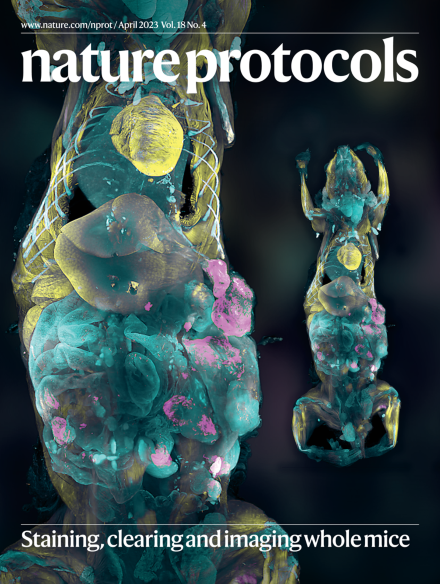Easy and accurate protein structure prediction using ColabFold
IF 13.1
1区 生物学
Q1 BIOCHEMICAL RESEARCH METHODS
引用次数: 0
Abstract
Since its public release in 2021, AlphaFold2 (AF2) has made investigating biological questions, by using predicted protein structures of single monomers or full complexes, a common practice. ColabFold-AF2 is an open-source Jupyter Notebook inside Google Colaboratory and a command-line tool that makes it easy to use AF2 while exposing its advanced options. ColabFold-AF2 shortens turnaround times of experiments because of its optimized usage of AF2’s models. In this protocol, we guide the reader through ColabFold best practices by using three scenarios: (i) monomer prediction, (ii) complex prediction and (iii) conformation sampling. The first two scenarios cover classic static structure prediction and are demonstrated on the human glycosylphosphatidylinositol transamidase protein. The third scenario demonstrates an alternative use case of the AF2 models by predicting two conformations of the human alanine serine transporter 2. Users can run the protocol without computational expertise via Google Colaboratory or in a command-line environment for advanced users. Using Google Colaboratory, it takes <2 h to run each procedure. The data and code for this protocol are available at https://protocol.colabfold.com . We describe the use of ColabFold to perform structure prediction of monomers, complexes and alternative conformations, either on the web or locally, and provide guidance on interpreting the results through confidence metrics and visualizations.

使用 ColabFold 轻松准确地预测蛋白质结构。
自 2021 年公开发布以来,AlphaFold2(AF2)通过使用单个单体或完整复合物的预测蛋白质结构来研究生物学问题已成为一种常见做法。ColabFold-AF2是谷歌实验室(Google Colaboratory)内的一个开源Jupyter笔记本,也是一个命令行工具,可以方便地使用AF2,同时提供其高级选项。ColabFold-AF2 优化了 AF2 模型的使用,缩短了实验的周转时间。在本协议中,我们将通过三种方案指导读者了解 ColabFold 的最佳实践:(i) 单体预测;(ii) 复合物预测;(iii) 构象采样。前两个方案涵盖经典的静态结构预测,并在人类糖基磷脂酰肌醇转酰胺酶蛋白上进行了演示。第三个方案通过预测人类丙氨酸丝氨酸转运体 2 的两种构象,展示了 AF2 模型的另一种使用情况。用户可以通过谷歌实验室(Google Colaboratory)或高级用户的命令行环境运行该协议,而无需计算方面的专业知识。使用谷歌实验室只需
本文章由计算机程序翻译,如有差异,请以英文原文为准。
求助全文
约1分钟内获得全文
求助全文
来源期刊

Nature Protocols
生物-生化研究方法
CiteScore
29.10
自引率
0.70%
发文量
128
审稿时长
4 months
期刊介绍:
Nature Protocols focuses on publishing protocols used to address significant biological and biomedical science research questions, including methods grounded in physics and chemistry with practical applications to biological problems. The journal caters to a primary audience of research scientists and, as such, exclusively publishes protocols with research applications. Protocols primarily aimed at influencing patient management and treatment decisions are not featured.
The specific techniques covered encompass a wide range, including but not limited to: Biochemistry, Cell biology, Cell culture, Chemical modification, Computational biology, Developmental biology, Epigenomics, Genetic analysis, Genetic modification, Genomics, Imaging, Immunology, Isolation, purification, and separation, Lipidomics, Metabolomics, Microbiology, Model organisms, Nanotechnology, Neuroscience, Nucleic-acid-based molecular biology, Pharmacology, Plant biology, Protein analysis, Proteomics, Spectroscopy, Structural biology, Synthetic chemistry, Tissue culture, Toxicology, and Virology.
 求助内容:
求助内容: 应助结果提醒方式:
应助结果提醒方式:


